I love our family tradition of getting a tasty hot drink and driving out to the Christmas tree farm to pick up the tree. It’s a tradition that continues even with grown kids, but we’re upgrading our outing by bringing our own mugs.
That might not sound too exciting but let me explain the benefits.
When you bring your own mug, you’re reducing your exposure to the microplastics that line that coffee shop paper cup.
Side bonus, your mug will probably keep your drink warmer way, way longer, and if someone happens to drop their drink in the car, it is probably going to be a smaller/no spill.
The idea came to me when I was listening to Dhru Purohit Podcast as he interviewed board-certified Toxicologist Dr. Yvonne Burkart. The topic of this specific episode was Toxicologist Reveals the Top Sources of Hidden Toxins We’re Being Exposed to Daily, and a recurring theme was that there are simple things we can all do to reduce our toxin exposure.
About an hour in, because it is a long-form podcast, the host brought up the question of paper cups at coffee shops. Each cup is lined with a thin layer of plastic, confirmed Dr. Burkart, who added that studies show that microplastics leak into our hot beverages from these cups. She also confirmed that most cups are not lined with wax, but plastic.
I found one of these studies featured in an article:
“An average person drinking three regular cups of tea or coffee daily, in a paper cup, would end up ingesting 75,000 tiny microplastic particles, which are invisible to the naked eye,” explains Sudha Goel, MD, the lead author on the study. “In the 15 minutes it takes for coffee or tea to be consumed, the microplastic layer on the cup degrades.”
These plastics get into our cells, because they are in clothes, cosmetics, coffee cups, and more. We drink and eat them. But even though plastics are everywhere, which can feel like an overwhelming problem, scientists are still researching what is the effect of all these plastics.
In Microplastics in the human body: What we know and don’t know, the author writes, “What recent research makes clear so far is that microplastics are ubiquitous, that these particles enter peoples’ bodies regularly during inhalation or through consumption of food or drinks, and that they find their way into vital body systems.
“Some studies of laboratory animals and cells grown outside the body suggest that there are reasons for concern about how these minuscule pieces of plastics affect our physiology.
“What remains less apparent is what risks to health, if any, these tiny particles pose at the concentrations they’ve been found. Scientists say the flurry of recent studies, and headlines, represent their first steps toward understanding the impact these particles have on our daily lives.”
As you can see, the research is still coming out; in the meantime, let’s take the approach of not worrying but be wise about taking small steps to minimize toxin exposure. It’s similar to our conversations about filtering our water and minimizing pollen, dust, and other irritants in our home.
So back to that podcast …
As they chatted about how they both love getting a good cup of brew, it dawned on me that a simple thing we can all do is to put aside those plastic-lined cups. Plus, it is Christmas time, which gives us a perfect reason to gift ourselves or others reusable cups. What a great stocking stuffer! Dr. Burkart shared that she loves getting coffee and her strategy is to bring her own coffee cup. We can all do that!
A few years ago, I received an insulated water flask for Christmas. I love it. (It looks similar to this one.) Companies like Yeti make mugs with various sizes that are dishwasher safe and keep liquids cold and hot for a long time. It’s a practical, awesome gift. I have one and love it!
I say keep getting that Christmas latte. Now, just bring your mug. Don’t be surprised if some shops won’t prep the drink in your mug; just pour your drink into the reusable mug right away, if needed. If you’re staying at the coffee shop, try a place that serves coffee in a mug.
Enjoy your drink. Cheers to a safer cup of coffee and your health!



![z31[1]](https://simplywholebydevi.com/wp-content/uploads/2018/06/z311-100x100.jpg)












